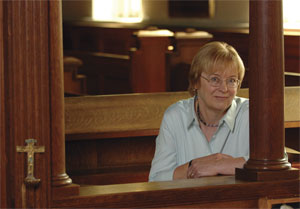 |
| Writer Anne Emery. (Danny Abriel Photo) |
Hidden in the plain brown envelope sent by author Anne Emery are some clues. Inside are CDs — the playlists she listened to while writing her award-winning first novel Sign of the Cross and its follow-up Obit — along with typewritten quotes, like chapter headings for a novel as yet unwritten. “Music is the harmonious voice of creation; an echo of the invisible world,” reads the first. The credit for that one goes to Giuseppe Mazzini (1805-72). The second one is from Victor Hugo (1805-85): “Music expresses that which cannot be said, and on which it is impossible to be silent.”
Music, it seems, is integral to her imagination and she shares the preoccupation with her fictitious creation Brennan Burke, choirmaster and priest. She hastens to assure me when she offers to send me the discs that she only burns music she already owns, music she’s paid for. Yes, the music is vital to Anne Emery, and to her characters, but the legal side of things is just as important.
Ms. Emery (LLB’78, MA’89) has worked as a lawyer, legal affairs reporter and as a researcher. These days, she works at McInnes Cooper in Halifax as a litigation law analyst. Nights and weekends, she writes. “I’m not a joiner,” she says. “I’m not a strict housekeeper, either.”
Instead, most days she walks for an hour or so around her North End Halifax neighbourhood. And she listens to music on her MP3 player — blues, rock, opera or chants. She thinks about two of the most important men in her life. There’s Monty Collins, the sole criminal lawyer in a corporate law firm, with his acerbic soon-to-be ex-wife and a secret desire to chuck it all for life in a blues band. And there’s Father Burke, an Irish Catholic priest with a mysterious past. Her husband doesn’t mind that she thinks about these other men. After all, it’s been wildly successful for her. The pair first meet in her debut novel, Sign of the Cross. It picked up a prestigious Arthur Ellis award this year for best first crime novel.
And when we meet in a downtown Halifax steak house to discuss her book’s success, she draws on Mazzini to explain Brennan Burke’s reliance on music. “It means everything to him,” she says. “That’s the expression of the divine, ‘the harmonious voice of creation.’ It expresses the inexpressible. For him, that’s his way of worshipping or praising God.”
Ms. Emery is somewhere between her two leading men when it comes to music. “I can write a book, but not a song.” She just needs music the way she needs water or air.“I can’t imagine life without it,” she says. It’s an integral part of her writing process as well. Songs give her ideas about characters. Bob Dylan’s Man in a Long Black Coat was an early inspiration for Sign of the Cross, as was Matt Minglewood’s Dorchester. She credits the music with letting her get into an elevated mood, the kind it’s easy to be creative in. She listens to music, walks the streets of Halifax, and her characters and stories develop as she goes.
Those familiar streets have been just as influential on her writing style. “There’s so much history in Halifax,” she says. “It has great buildings and a great atmosphere. A really new city, with brand new buildings, and everyone just moved there 10 minutes ago — that wouldn’t be interesting to me. But this place has a past.” Her books — two published so far, with a third on the way and three more planned in the series — are set firmly in Halifax’s very recent past.
The story unfolds on streets and by landmarks that will be familiar to anyone who’s spent time in the port city. Monty and Brennan meet when the priest is accused of murder at his church (incidentally, one of the few fictional locations). Gargoyles in the provincial court glare down at Monte. The statue of Winston Churchill is here. The Collins family lives on Dresden Row. The law courts, the waterfront, Dalhousie — it’s all there.
Though Ms. Emery doesn’t draw on her daily work as a law analyst when it’s time to write fiction, she does use her research skills and the materials at hand,“… everything from the 1990 Criminal Code to old city directories, to find out what was where in Halifax in 1990.” Research skills were handy in obtaining copyright clearances for the many lyrics she wanted to use in the book. “Music was so important to Sign of the Cross — I had to use it, no matter the hassle or expense.”
Meanwhile, she knows how she’ll be spending her nights and weekends. “I always knew I wanted to write,” she says, “since I was a kid. But I thought that law would be interesting work. I probably imagined myself with earth-shattering cases. Then I realized that I would rather make up my own drama than stand or fall on someone else’s life.” Her friends had no idea what she was up to until the book came out, but they were supportive and encouraging once they discovered her other life. While she may find ‘seeds of stories’ in the work of friends who practice criminal law, the demarcation between her worlds — law analyst and crime fiction writer — is clear. “People think certain characters represent someone or other,” she says. “Who knows? Maybe that accounts for a few sales.”
As for her future, she describes being at a function with her publisher. Someone asked when she was going to ‘quit her day job’ and write full time. “My publisher leaned over and said, ‘When we sell the movie rights.’”
For now, she’s happy to lead a double life.
Stephanie Domet is a writer-broadcaster who lives in Halifax.
